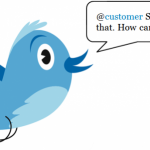 It’s rare now to find an organization that doesn’t have a presence on Twitter, and as such, many customers take to the social network to complain when they aren’t happy with the service they’ve received.
It’s rare now to find an organization that doesn’t have a presence on Twitter, and as such, many customers take to the social network to complain when they aren’t happy with the service they’ve received.
Whilst many no doubt do this with the best of intentions, a recent study highlights the risks involved. It reveals that rather than soothing the issues of one customer, it can actually trigger a fresh wave of complaints from others.
The study, from researchers at Carnegie Mellon, questioned whether the flock of companies onto Twitter is actually helping to resolve customer service queries or not.
The double edged sword of Twitter
The analysis found a mixed bag. On one hand when a customer complains to you via Twitter, it tends to benefit your relationship with them if you attempt to answer their queries.
On the other hand however, your responsiveness raises the expectations of that customer, whilst also encouraging other customers to come forward with their own queries.
About the study
The authors trawled through the Twitter based customer service encounters of a major telco company, before then applying a statistical model to the data to determine how the customers’ relationship changed with the company over time.
“People complain on Twitter not just to vent their frustration,” the researchers say. “They do that also in the hope of getting the company’s attention. Once they know the company is paying attention, they are more ready to complain the next time around.”
Of course, how negative this really is is open to debate. The customers were having issues whether they reported it to the company or not, so you would imagine it is much better to be aware of the problem and attempt to rectify things than have it remain unknown and not dealt with.
The spread of good news
As the old maxim goes, a disgruntled customer is also more likely to share their bad experiences with friends. So if you can turn a bad situation round, this is likely to improve your image in the eyes of the friends who will hear about the encounter from the customer.
“What people say about a company on social media does reflect their true perceptions, but only to a certain extent,” the authors say. “There are also other important factors that affect what they say, the company’s past responses to complaints being one of them. This is a key takeaway for understanding and managing service interventions on social media.”
The takeaway is that if you’re using Twitter for customer service then it’s probably a good thing and you should continue, just beware that your efforts will create an expectation in the eyes of your customers, which if you fail to meet could rebound on you.
I doubt that any problem is ever resolved via Twitter, but it does say to the customer that they're being listened to. That's often half the battle as when they're disgruntled, I suspect most customers just feel very unimportant.